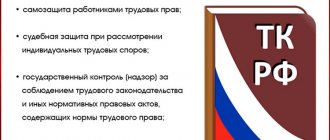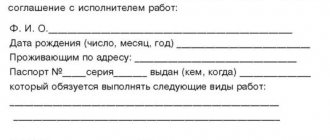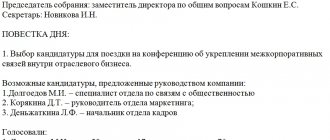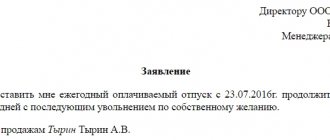From this article you will learn:
- What are the causes of collective disputes?
- What is the procedure for resolving collective labor disputes?
- What are the stages of the conciliation procedure for resolving collective labor disputes?
- What is the procedure for negotiating when resolving collective disputes?
- Is it possible to resolve collective disputes through a strike?
- What is the procedure for executing decisions on collective disputes?
- How collective labor disputes are considered in court
Resolving collective disputes is a rather complex process. According to the legislation of the Russian Federation, a collective labor dispute is considered to be unresolved disagreements between workers and employers (or proxies of both parties). Most often, the cause of the conflict is a change in working conditions, in particular wages, as well as the signing, adjustments and implementation of collective agreements and agreements.
In addition, contradictions between management and employee representatives may arise in the process of agreeing on the organization’s labor regulations. This material will tell you about the numerous subtleties and options for the peaceful resolution of individual and collective labor disputes.
What may become the subject of collective disputes
The provisions of Article 398 of the Labor Code of the Russian Federation define a labor dispute as unresolved contradictions between workers and the management of the organization (or representatives of both parties), related to the establishment and adjustment of working conditions (including wages), conclusions, amendments and execution of collective agreements, as well as situations when management ignores the opinion of employee representatives during the adoption of company regulations. We are talking about collective agreements and socio-economic working conditions (changes in production standards, piece rates, wage levels, the introduction of wage systems, work schedules, labor protection, etc.).
The conflicting parties can be the employees of the enterprise (work collective) and the industry higher management. Insufficient funding for enterprises or organizations in a particular industry often becomes a cause of discrimination against employees (teachers, doctors, miners, etc.). Specialists who have their rights and legitimate interests infringed put forward demands, and if local governments are incompetent in resolving the dispute, the issue is delegated to the supreme leadership.
The demands of labor collectives that are not related to labor disputes (political, environmental, etc.) are considered separately.
You may also be interested in: Monitoring employee performance: types, methods, mistakes
Causes
The cause of labor disputes is usually uncertainty and lack of agreement on certain issues.
Perhaps the employer issued an act that was not entirely lawful, or the employee does not fully understand that changing the schedule is an obligatory task that is intended to only make things better.
One way or another, a collective labor dispute is an excellent way to establish mutual understanding between an employee or employer.
General procedure for resolving collective labor disputes
The procedure for resolving collective disputes is determined by Chapter 61 of the Labor Code of the Russian Federation.
Time limits for resolving collective labor disputes:
The diagram clearly shows the procedure for resolving collective disputes:
Who can participate in the resolution of collective labor disputes:
- the head of the enterprise or his representatives appointed by a special order, power of attorney or legal act on a structural unit that complies with the legislation of the Russian Federation;
- workers and trade unions elected at the general meeting. Other representatives are allowed if the employees are not united in a single trade union, and also if the trade union organization includes less than half of the subordinates of a particular employer or it does not represent the interests of all employees.
If the conflict occurs at the level of senior management, its participants will be:
- trade unions, their territorial organization or associations authorized by the charter of these enterprises;
- associations of employers authorized by the charter of such a structure.
Resolution of a collective dispute occurs if the conflicting parties enter into an agreement between themselves that involves the restoration of the violated rights of the injured party.
If the employer (his representative) announces a complete or partial rejection of the demands put forward by subordinates (their representatives), this moment is officially considered the beginning of a collective labor dispute at the organization level. Also, the date for opening a labor dispute is set based on the fact of ignorance and lack of a written response from the management of the organization three working days after familiarization with the requirements.
At a level that goes beyond the boundaries of the enterprise, the moment of the beginning of a labor dispute is recognized as the day when a representative of employers or their associations in writing fully or partially rejects the demand of trade union organizations or their associations. A labor dispute is considered open if a decision regarding the claims made is not made within a month and the association of employers avoids answering.
If management does not provide a response within the prescribed period, or rejects the workers’ demands in full or in part, all participants can propose in writing to the opponent to form a conciliation commission and determine its quantitative and personal composition for each party.
You may also be interested in: How to establish crisis management in an enterprise
Conciliatory
Each dispute should have a positive or negative result, and the conciliation procedure is exactly the case when both employees and the employer can agree on the basis on which their relationship will proceed further.
For reconciliation, a conciliation commission usually meets. If one of the disputing parties has a mistrust of the commission, then the dispute is considered with the direct participation of a mediator. As a last resort, the dispute is referred to labor arbitration.
The period for consideration of a collective labor dispute is determined by law, however, at the request of the parties, it can be extended for a longer period.
The participation of the conciliation commission is mandatory. The conciliation commission is equipped with representatives of both sides. All these parties must confer before reaching a consensus and reaching a verdict. Let me remind you once again that the procedure, unlike labor arbitration, is mandatory.
The mediator considers the dispute for about five days. As a rule, the mediator is a person who is not interested in anything, who must come to the right decision.
Labor arbitration is an extreme measure that should not be resorted to at all, otherwise your dispute will drag on indefinitely, and production and work as such will come to a standstill.
Negotiations as a way to resolve collective labor disputes
Resolution of collective disputes is possible through negotiations, which include several stages: preparation, negotiations themselves and subsequent summing up.
Each party defends its own interests - requests, needs, intentions and expectations that set the direction of the negotiations. Unlike interests, the position held by each party is a means to an end, not the end itself. In the process of dialogue, it is not enough to simply announce statements, complaints and ultimatums. The result of the negotiations must suit both parties to the labor dispute. Even partial satisfaction of requests is better than the absence of any compromise.
Collective bargaining can be carried out between the employer (group of enterprises) and the workers' organization (association of organizations). The most frequently discussed issues are related to:
- working conditions and daily workload;
- relationships between management and subordinates;
- relationship between the employer and the employee organization.
The main principles of collective bargaining for the purpose of resolving labor conflicts are:
- constant adherence to the legislation of the Russian Federation;
- equal distribution of rights and competencies between the parties;
- equality of the parties;
- interaction based on respect for the interests of the opposing party;
- involvement and interest of participants in a collective dispute;
- absence of pressure and coercion when accepting obligations to be fulfilled;
- supervision of compliance with agreements;
- serious responsibility for deviation from agreements.
Article 36 of the Labor Code of the Russian Federation reveals that each of the parties participating in collective bargaining has the right to independent active actions.
According to Article 29 of the Labor Code of the Russian Federation, employee representatives can be:
- trade unions and organizations equivalent to them;
- associations authorized by interregional and all-Russian trade union organizations;
- other representatives.
To conduct negotiations, resolve a dispute, formulate an agreement or make adjustments, the creation of a special commission is required. Its numerical and personal composition is determined by the trade union.
The tasks of the trade union include organizing and conducting negotiations, concluding agreements or making adjustments to them, and monitoring compliance with agreements. If workers are interested in participating in negotiations, they entrust the trade union organization with protecting their own interests in the existing collective dispute.
Subordinates who are not united in a trade union and who are involved in a labor conflict with management can independently choose a representative or other body that will take part in the negotiations (in accordance with Article 31 of the Labor Code of the Russian Federation). Election takes place by secret ballot. A similar procedure is provided if less than half of the enterprise’s employees belong to a trade union organization. The appointed body or representative has the right to carry out its term together with the trade union without restrictions or obstacles to work from the management of the enterprise.
Participants in collective bargaining can be both employees and their authorized representatives. The competencies and capabilities of the employer's representative are distributed taking into account the complexity and nature of the tasks being solved. For example, an association of employers is responsible for concluding agreements, making adjustments to agreements, resolving emerging disputes, problems of social and labor relations.
Representatives of enterprise management are required to attend collective negotiations organized for the purpose of concluding initial agreements or agreements and making adjustments to existing documentation.
The employer may act:
- enterprise management;
- IP;
- other authorized representatives.
According to Article 36 of the Labor Code of the Russian Federation, collective bargaining can be proposed by both parties to the dispute. Each party is obliged to formulate in advance clear claims and wishes that will be considered. Next, a notice of the opening of collective bargaining is drawn up, after which the discussions themselves begin.
The notice of negotiations must indicate the exact date, location and composition of the parties' representatives. From three to seven people are allowed on each side.
Negotiations must begin within seven days after representatives of the parties receive notification. The initiator receives a response containing a list of all participants, their competencies and responsibilities. As a rule, the next day after the initiator becomes familiar with the information, collective negotiations are held.
Representatives of employers who are paid by the management of the enterprise, political organizations or local governments are prohibited from speaking on behalf of employees, certifying or correcting any documentation on behalf of subordinates.
To conduct negotiations, a commission is created that includes the same number of participants on each side with equal rights.
The procedure for conducting collective bargaining can be divided into several stages:
Stage 1. The collective bargaining process is preceded by a period when the parties decide to hold it and notify the date of the meeting. The initiator can be both employees and employers or representatives of both parties. The decision is made at the relevant meeting. If the enterprise does not have an officially concluded collective agreement, a decision on the date of negotiations can be made at any time. If a collective agreement is officially concluded, negotiations are scheduled within three months before its end.
Stage 2. Next, you need to issue an order to form a commission to conduct negotiations. The process takes no more than seven business days after receiving notice of collective bargaining. The order must be accompanied by an approved decision of representatives of the workers' side. The documentation determines the regulations, the timing of the development of the collective agreement, as well as the members of the commission, which is formed on a voluntary basis.
The commission on the employee side includes representatives who have the right to develop a project and conclude a collective agreement. In their absence, workers can act independently. In such a situation, the agreement is concluded in the form of a single document that protects the interests of the company’s employees.
Stage 3. Discussion and development of a draft collective agreement takes place within the time frame stipulated in advance by the parties to the dispute. Disagreements that cannot be resolved through discussion are governed by the provisions of Article 38 of the Labor Code of the Russian Federation.
Stage 4. Negotiations for the purpose of developing a project end with a meeting of all employees and representatives of the enterprise management, approval and certification of the accepted documentation. The agreement is valid for one to three years after signing. Amendments and additions are provided for in the contract and are carried out by agreement of the parties.
Upon expiration of the contract, it is automatically extended until a new one is signed or adjustments are made to the existing document. The collective agreement is not considered terminated upon a change of management, reorganization of the enterprise (except for proposals put forward by the parties) and the end of the employment contract. The agreement is valid throughout the entire process of liquidation of the company.
Stage 5. Registration of the contract and its annexes, reflecting the main provisions of collective bargaining, with the Department of Labor is entrusted to the employer. The procedure is carried out within seven days after the conclusion of the agreement. Registration does not mean making a decision in favor of one of the parties. Registration of an agreement cannot be refused, even if errors are found in the text of the document.
Registration is a mandatory procedure and is aimed at giving the collective agreement the status of a legal document that protects the interests of employees. The Labor Department is obliged to identify all terms of the contract that may harm the position of workers (relative to the legislation of the Russian Federation, including the Labor Code of the Russian Federation). If conditions are discovered that worsen the position of subordinates, the Labor Department is obliged to inform representatives of both parties and the labor inspection authorities about this.
The minutes of collective bargaining are as follows:
The protocol must contain the main provisions and agreements of collective bargaining:
- protocol number;
- name and exact date of the meeting;
- composition of the commission indicating the full names of the participants and their positions;
- a list of issues discussed and the results of their resolution;
- voting results on each of the issues considered;
- final signatures of all participants.
You may also be interested in: How to establish crisis management in an enterprise
Strike as a way to resolve collective disputes
The legislation of the Russian Federation carefully elaborates the competencies and rights of bodies for resolving collective labor disputes. The Labor Code of the Russian Federation fully reflects the procedure for resolving contradictions between the parties immediately before the emergence of a labor dispute considered by the participants of the conciliation commission. This makes it possible to prevent a collective labor dispute.
Of course, the code does not call for workers to go on strike, but recognizes it as a method of resolving a dispute. The Labor Code of the Russian Federation reflects the procedure for declaring a strike, legal guarantees for participants and responsibility for the illegal organization of such an act of protest.
A strike means a period when employees of an enterprise partially or completely do not carry out their direct labor duties, seeking to resolve the existing conflict with the employer. Such an act is of an ultimatum nature in comparison with conciliation procedures. Stopping the labor process forces the employer to listen to subordinates whose rights are infringed. In fact, this is an extreme measure that employees take to defend their legitimate rights and interests.
In accordance with Article 398 of the Labor Code of the Russian Federation, only labor collectives whose demands cannot be satisfied peacefully have the right to participate in a strike.
Article 37 of the Constitution of the Russian Federation provides for a strike as an option to resolve the conflict between the employer and employees. At the same time, Article 55 of the Constitution and Article 413 of the Labor Code of the Russian Federation limit the right to strike.
Such actions are considered illegal:
- if a state of emergency or martial law is declared in the country;
- in organizations of the Armed Forces and ensuring the country's defense;
- in the structural divisions of the Ministry of Emergency Situations;
- in law enforcement agencies;
- in special and hazardous industries;
- at ambulance and emergency stations;
- in organizations that ensure the livelihoods of residents (energy supply, heating, heat supply, water supply, gas supply, aviation, rail and water transport, communications, hospitals), if the strike damages the safety, life, health of the population and the country as a whole.
A strike by workers is permissible if:
- it was preceded by conciliation procedures;
- the employer avoids participation in conciliation procedures;
- the employer ignores and does not comply with the agreements established during the labor dispute.
The employee takes voluntary participation in the strike. Persons who force participation in such an action or refusal from it bear liability, including criminal liability.
The management of the enterprise and its representatives do not have the right to organize a strike.
The decision to hold such a protest action is made at a general meeting of workers, representatives, trade unions or associations of trade union organizations. All listed bodies have the right to declare a strike if they include at least two-thirds of the total number of workers or trade union members.
To make a decision, at least half of those present at the meeting must vote for it. Part 4 of Article 410 of the Labor Code of the Russian Federation provides options if it is impossible to organize a meeting: a representative of employees has the right to make an appropriate decision, having previously collected the signatures of more than half of the team members. The meeting also elects the body that will lead the strike.
Within 10 days before the start of the action, the management of the enterprise must notify the Service, suppliers and consumers about the upcoming event and prepare conditions for maintaining the operability of production, machinery, equipment, etc.
During a strike, each party is obliged to make efforts to reach an agreement to resolve the collective dispute.
In organizations that ensure the livelihoods of the population (hospitals, electricity and gas supplies, etc.) during a protest, minimal assistance should be provided to residents. Within 5 days after the decision to hold a strike is made, the parties to a collective dispute, together with executive authorities and local governments, establish this minimum of services. If services are provided improperly during the designated period, the promotion may be considered illegal.
The result of the strike is the signing of an agreement between the parties. However, by decision of the Supreme Court of the republic, territory, regional court, courts of Moscow and St. Petersburg, autonomous region, autonomous district, it can be declared illegal. To do this, the employer or prosecutor submits an application to the judicial service, after which they notify the body leading the protest action. If the court has determined that a strike is illegal, its decision must be implemented immediately.
If the action was declared illegitimate, but employees continue it even after receiving a court decision to postpone or stop it, they will be subject to liability provided for by the Labor Code of the Russian Federation. For example, an employer can issue a warning, fine an employee, or even fire him, considering absence from work as absenteeism. Disciplinary sanctions may also be applied to the organizers of an illegal strike.
If workers participated in a protest against their own will, those who coerce them through violence or threats will face criminal penalties. According to the legislation of the Russian Federation, such actions are punishable by imprisonment for up to one year or correctional labor for up to two years.
The company retains the specialist’s job during the strike. Payment of wages is made at the discretion of the employer.
According to the Federal Law “On the Procedure for Resolving Collective Labor Disputes,” workers who are not involved in a strike, but because of it cannot perform their direct duties, must receive payment for downtime in the amount of at least two-thirds of their rate. Management may also offer subordinates who do not take part in the protest to temporarily carry out other work while maintaining their average earnings. In turn, the specialist must perform new functions in accordance with certain labor standards or tariff rates.
A collective labor dispute is an unresolved disagreement between employees (their representatives) and employers (their representatives) regarding the establishment and change of working conditions (including wages), the conclusion, amendment and implementation of collective agreements, agreements, as well as in connection with the employer’s refusal to take into account the opinion of the elected representative body of workers when adopting local regulations (Article 398 of the Labor Code of the Russian Federation).
Specific features of a collective labor dispute are a special subject composition (its collective nature) and a special subject of disagreement.
The collective nature is manifested in the fact that one of the parties to the dispute are workers connected by a certain organizational unity (members of a trade union, employees of an organization, its separate structural unit) and united by common professional (social and labor) interests. The other subject of the dispute is either the employer or an association of employers, i.e. this side of the dispute can also be represented by a kind of collective - employers of a given industry, territory, etc.
The subject of a collective labor dispute is the legitimate interests and rights of workers united in labor collectives.
Such a dispute may arise over:
— establishing and changing working conditions;
— concluding, amending and implementing collective agreements;
— the employer’s refusal to take into account the opinion of the elected representative body of employees when adopting acts containing labor law standards in the organization.
Thus, in order for unresolved disagreements between employees and employers to be qualified as a collective labor dispute, both of these signs must be present. If a dispute is characterized by only one of them, it cannot be considered collective.
Collective labor disputes are traditionally considered as disputes about interests, which include, in particular, disputes that arose at the stage of collective bargaining. But the most common disputes at present are about the right - about the fulfillment of the terms of a concluded collective agreement or agreement.
Thus, according to their nature, collective labor disputes can be divided into two types:
— regarding the establishment or change of socio-economic conditions of work and life of workers, the conclusion or change of collective agreements and other social partnership agreements;
— regarding the implementation of collective agreements and agreements, certain norms of labor legislation.
In a collective labor dispute, their representatives act on behalf of the disputing parties . Representatives of workers are bodies of trade unions and their associations, authorized for representation in accordance with their charters, and other representative bodies formed at meetings (conferences) of workers and authorized by them. Representatives of employers are heads of organizations or other persons authorized in accordance with the charter of the organization, other legal acts, individual entrepreneurs (in person), authorized bodies of associations of employers, and other bodies authorized by employers.
State bodies for the settlement of collective labor disputes take part in the resolution of collective labor disputes. Such bodies are the federal executive body that carries out the functions of providing public services in the field of settlement of collective labor disputes (currently the Federal Service for Labor and Employment), and the executive bodies of the constituent entities of the Russian Federation involved in the settlement of collective labor disputes. Their tasks and powers are determined by Art. 407 Labor Code of the Russian Federation.
The day the collective labor dispute begins is the day the employer (his representative) communicates the decision to reject all or part of the workers’ (their representatives’) claims, or the employer (his representative) fails to communicate his decision within the prescribed period. From this moment, the parties can begin conciliation procedures for considering a collective labor dispute.
All actions of the parties to a collective labor dispute, agreements and decisions made in connection with the resolution of this dispute must be documented in protocols by representatives of the parties to the collective labor dispute, conciliation bodies, as well as the body leading the strike, if it takes place (Article 418 of the Labor Code of the Russian Federation) .
The procedure for resolving disagreements by the disputing parties themselves begins with the formulation and approval by the general meeting (conference) of employees of demands, which are set out in writing and sent to the employer. A copy of the requirements may be sent to the appropriate state body for the settlement of collective labor disputes. Employees and their representatives determined in accordance with Art. have the right to put forward demands. 29-31 and part 5 of Art. 40 Labor Code of the Russian Federation.
These requirements are approved by a majority vote of those present at the meeting (conference) (Article 399 of the Labor Code of the Russian Federation). In this case, a meeting of workers is considered valid if more than half of the workers are present at it, and a conference - if at least two-thirds of the elected delegates are present at it. The employer is obliged to provide employees or employee representatives with the necessary premises for holding a meeting (conference) to put forward demands and has no right to interfere with its holding.
Along with putting forward demands, workers elect their authorized representatives to participate in the resolution of a collective labor dispute.
The employer is obliged to accept for consideration the demands of employees sent to him and, within three working days from the date of receipt, inform in writing about his decision to the representative body of employees of the organization, (branch, representative office or other separate structural unit), individual entrepreneur. Representatives of employers (employer associations) at the federal, interregional, regional, territorial, and sectoral levels are given one month to respond to trade unions (their associations) (Article 400 of the Labor Code of the Russian Federation).
If all the requirements are satisfied, then the differences between the parties are settled and no dispute arises. If the employer completely or partially rejects these demands or does not respond to them, a collective labor dispute arises.
In accordance with Part 1 of Art. 401 of the Labor Code of the Russian Federation, the procedure for resolving a collective labor dispute consists of the following stages : consideration of a collective labor dispute by a conciliation commission; consideration of a collective labor dispute with the participation of a mediator and (or) in labor arbitration. At the same time, consideration of the dispute by the conciliation commission is a mandatory stage, and if agreement is not reached in the conciliation commission, the parties to the dispute begin negotiations on inviting a mediator and (or) creating a labor arbitration tribunal. The dispute is also referred to labor arbitration if one of the parties evades participation in the creation or work of the conciliation commission (Part 1 of Article 406 of the Labor Code of the Russian Federation).
Thus, there are three possible schemes for using conciliation procedures:
- conciliation commission - mediation;
— conciliation commission — labor arbitration;
— conciliation commission — mediation — labor arbitration.
None of the parties to a collective labor dispute has the right to evade participation in conciliation procedures. In addition, each of the parties to the dispute, at any time after it begins, has the right to contact the relevant government body for notification registration of the dispute.
Each conciliation procedure is carried out within the time limits provided for by the Labor Code of the Russian Federation, which, if necessary, can be extended by agreement of the parties to a collective labor dispute.
During the period of consideration and resolution of a collective labor dispute at all stages of conciliation procedures, workers have the right to hold meetings, rallies, demonstrations, processions and picketing in support of their demands in the manner established by Federal Law of June 19, 2004 No. 54-FZ “On meetings, rallies, demonstrations, marches and pickets."
The conciliation commission is a parity body of the disputing parties. It is created within three working days from the moment the collective labor dispute begins. The decision to create a commission at the local level of social partnership is formalized by the relevant order (instruction) of the employer and the decision of the employee representative. Decisions on the creation of conciliation commissions when resolving collective labor disputes at other levels of social partnership are formalized by relevant acts (order, regulation, resolution) of representatives of employers and representatives of employees. The conciliation commission is formed from representatives of the parties to a collective labor dispute on an equal basis. In this case, the parties do not have the right to avoid creating a commission and participating in its work, and the employer is obliged to create the necessary conditions for the work of the commission.
A collective labor dispute must be considered by a conciliation commission within five working days from the date of issuance of the order (instruction) on its creation. This period may be extended by mutual agreement of the parties, which is documented in a protocol. The decision of the commission is made by agreement of the parties to a collective labor dispute, is documented in a protocol, is binding on the parties to this dispute and is executed in the manner and within the time frame established by this decision.
The recommended procedure for organizing the work of a conciliation commission to consider a collective labor dispute is determined by Resolution of the Ministry of Labor of Russia dated August 14, 2002 No. 57.
After five calendar days of work by the conciliation commission, a one-hour warning strike may be declared once , of which the employer must be notified in writing no later than three working days in advance.
The second stage of conciliation procedures is the consideration of a collective labor dispute with the participation of a mediator. According to Part 1 of Art. 403 of the Labor Code of the Russian Federation, the parties can invite him within three working days after the conciliation commission draws up a protocol of disagreements. If necessary, the parties to a collective labor dispute may contact the relevant state body for the settlement of collective labor disputes for a recommendation for a mediator. If within three working days the parties to a collective labor dispute have not reached an agreement regarding the candidacy of a mediator, then they begin negotiations on the creation of a labor arbitration tribunal.
The procedure for considering a collective labor dispute with the participation of a mediator is determined by agreement of the parties with the participation of the mediator. Recommendations on organizing work to consider a collective labor dispute with the participation of a mediator were approved by Resolution of the Ministry of Labor of Russia dated August 14, 2002 No. 58.
Consideration of a collective labor dispute with the participation of a mediator is carried out within up to seven working days from the date of his invitation (appointment) and ends with the parties to the collective labor dispute adopting an agreed decision in writing or drawing up a protocol of disagreements.
If an agreement between the parties on the dispute is not reached and a protocol of disagreements is drawn up, then from that moment the parties turn to the third stage of conciliation procedures - labor arbitration. Labor arbitration is a temporary body for the consideration of a collective labor dispute, which is created if the parties to this dispute have entered into an agreement in writing on the mandatory implementation of its decisions (Article 404 of the Labor Code of the Russian Federation).
Labor arbitration is created by the parties to a collective labor dispute and the relevant state body for the settlement of collective labor disputes no later than three working days from the date of completion of consideration of the dispute by the conciliation commission or mediator.
In cases where employers (their representatives) evade the creation of labor arbitration or refuse to implement its decisions, workers may begin organizing a strike, except in cases where, in accordance with the Labor Code (Parts 1 and 2 of Article 413) in order to resolve collective labor dispute the strike cannot be carried out. In these cases, the creation of labor arbitration is mandatory and its decision is binding on the parties.
The creation of a labor arbitration, its composition, regulations, and powers are formalized by a corresponding decision of the employer, the employee representative and the state body for the settlement of collective labor disputes. In this case, the parties may take into account the Recommendations on the organization of work on the consideration of a collective labor dispute in labor arbitration, approved by Resolution of the Ministry of Labor of Russia dated August 14, 2002 No. 591. If the parties do not agree on the creation of a labor arbitration, its composition, regulations and powers When the establishment of arbitration is mandatory, the decision on these issues is made by the relevant state body for the settlement of collective labor disputes.
A collective labor dispute is considered in arbitration with the participation of representatives of the parties to this dispute within five working days from the date of its creation. Recommendations of the labor arbitration tribunal for the settlement of a collective labor dispute are transmitted to the parties to this dispute in writing.
The agreement reached by the parties during the resolution of a collective labor dispute is drawn up in writing and is binding on the parties. Control over its implementation is carried out by the parties to a collective labor dispute (Article 408 of the Labor Code of the Russian Federation).
Execution of decisions on collective labor disputes
Resolution of a collective dispute is possible at any stage of interaction between the parties. An agreement can be concluded based on the results of the work of the conciliation commission, after the involvement of a mediator, or upon the fact that the parties’ agreements have been fulfilled.
An agreement concluded in the process of resolving a conflict between an employer and employees is drawn up in writing and is binding on each party in accordance with Article 408 of the Labor Code of the Russian Federation. Both parties control the implementation of the agreement. If an employer or his representative evades fulfilling his own obligations, he will face an administrative fine in the amount of 20–40 minimum wages.
You may also be interested in: Bonuses for employees of the organization and its documentation
Consideration
Collective labor disputes are considered by the following bodies:
- labor dispute commission;
- conciliation commission;
- labor arbitration;
- courts.
Let's start with the first body - the labor dispute commission . It is the first step in resolving conflicts between employees and the employer.
The task of the labor commission is to create conditions for the parties to come to an agreement. The commissions, it must be said, are formed from employees and employers of this organization.
If the labor dispute commission failed to cope with the task assigned to it and the parties did not come to a common decision, then the conciliation commission begins its action. Thus, the conciliation commission consists of professional mediators who will try their best to come to a common opinion.
If the commissions do not help, it is the turn of labor arbitration , which, through judicial review, comes to a single correct conclusion based on the testimony and makes a binding decision.
Other courts in the court system of the Russian Federation are also empowered to consider controversial labor issues.
Is it possible to resolve collective labor disputes through court?
In most cases, courts accept a collective dispute for consideration if its resolution is impossible through the conciliation procedures provided in the Labor Code of the Russian Federation.
The thing is that Articles 352 and 401 of the Labor Code of the Russian Federation propose and oblige the parties to the conflict to use the main methods of protecting the interests and rights of workers, including filing a corresponding application with the court. In addition, the legislation of the Russian Federation does not prohibit going to court to resolve a collective labor dispute.
Jurisdiction and subordination of a collective labor dispute to a court of general jurisdiction is determined in Chapter 3 of the Civil Procedure Code of the Russian Federation.
According to paragraph 1 of part 1 of Article 22 of the Civil Procedure Code of the Russian Federation, courts of general jurisdiction participate in the consideration of claims where the parties are persons, organizations, state authorities and local governments. The cases concern the protection of violated or disputed rights, freedoms and legitimate interests in disputes arising from civil, family, labor, housing, land, environmental and other legal relations. In this case, it does not matter what kind of disputes they are - collective or individual.
In turn, the magistrate court considers cases arising from labor relations, with the exception of cases of reinstatement and cases of resolution of collective labor disputes. It turns out that magistrates cannot take part in resolving a collective dispute (clause 6, article 23 of the Civil Procedure Code of the Russian Federation).
Collective labor disputes are subject to the jurisdiction of district courts and are considered in them as in courts of first instance, in accordance with Article 24, with the exception of cases falling under Articles 23, 25, 26, 27 of the Civil Procedure Code of the Russian Federation.
Consequently, the Civil Procedure Code of the Russian Federation:
- does not limit the consideration of labor disputes, individual or collective (Article 22 of the Civil Procedure Code of the Russian Federation);
- clearly establishes the non-jurisdiction of a collective labor dispute to the magistrate court (Article 23 of the Civil Procedure Code of the Russian Federation);
- argues that district courts can consider a collective labor dispute. Other courts (military, supreme court of the republic, regional, regional court, federal city court, autonomous region court, autonomous district court and the Supreme Court of the Russian Federation) are not considered courts of first instance for resolving collective labor disputes (Article 24 of the Civil Procedure Code of the Russian Federation);
- allows consideration of a collective labor dispute in the manner of claim proceedings (clause 1, part 1, article 22 of the Civil Procedure Code of the Russian Federation).
Going to court to resolve a collective dispute is the exception rather than the rule. Based on the provisions of Article 132 of the Civil Procedure Code, together with the statement of claim it is necessary to provide:
- copies of the claim in a multiple of the number of defendants and third parties;
- confirmation of payment of state duty;
- documents confirming the competence of the plaintiff’s representatives;
- documents reflecting and confirming the circumstances in connection with which the plaintiff puts forward his claims;
- if necessary, copies of documents reflecting and confirming the circumstances in connection with which the plaintiff puts forward his demands, in a number that is a multiple of the number of defendants and third parties;
- the text of the normative legal act that will be challenged;
- evidence of facts that the parties tried to resolve a collective dispute pre-trial, if this is provided for by the Federal Law “On the Resolution of Collective Labor Disputes”;
- calculation of the amount of money collected or disputed, certified by the plaintiff or his representative;
- copies of the calculation in a multiple of the number of defendants and third parties.
If the plaintiff violates the procedure for resolving a collective dispute provided for by law or an agreement between the parties, the court may refuse to consider the claim (according to paragraph 2 of Article 222 of the Civil Procedure Code of the Russian Federation). In this regard, the applicant must provide evidence of the facts that the parties tried to resolve the collective dispute in pre-trial proceedings, if this is provided for by the Federal Law “On the Resolution of Collective Labor Disputes”.
You may also be interested in: How to make your business successful and not become a “fireman” for your company
Examples of resolving collective labor disputes
Example 1. One of the brightest and most memorable stories related to the resolution of collective disputes is the situation that happened with the Kuzbass miners. In the early nineties, miners were subjected to terrible and inhumane working conditions.
Of course, at first the situation developed according to the law. The workers filed a collective claim, but did not wait for a response from management and took more decisive action - they went on strike.
Even the participation of members of the Supreme Soviet of the USSR could not resolve the current situation. Ultimately, the strike was stopped, but not by reaching an agreement between management and miners, but by a change in the government regime in the country.
Example 2. Resolution of collective labor disputes occurs not only in favor of workers. For example, an enterprise in the Leningrad region managed to achieve recognition of the illegality of the strike. The deadline for providing notice to the employer about the planned protest action was exceeded. Taking into account Article 410 of the Labor Code of the Russian Federation, the court found the workers guilty.
If the labor collective is unable to present competent and clear demands, this will have a negative impact on the workers’ side in resolving a collective dispute. There are often cases when trade unions acted as defendants in cases of illegal stoppage of work, as they did not have sufficient competence and knowledge in such matters.
Classification
If we talk about the nature of the emergence of collective labor disputes, then it undoubtedly lies in their classification. Scientists identify many types of disputes, however, all legal theorists are inclined to one, general theory:
- Dispute about changes in working conditions. For example, the wages of employees, their jobs and other conditions related to the implementation of their activities may change.
Disputes regarding a collective agreement (conclusion, amendment or termination). The collective agreement provides for various types of regulations that apply to the employees themselves. Therefore, unauthorized changes to this document may lead to a collective labor dispute between the parties.
- Disagreements may also arise due to the fact that the employer does not listen to the opinion of the elected employee representative. The representative is elected by a majority vote of workers and represents the interests of workers before the management of the organization. Refusal of requests by the employee representative may lead to a collective labor dispute.











